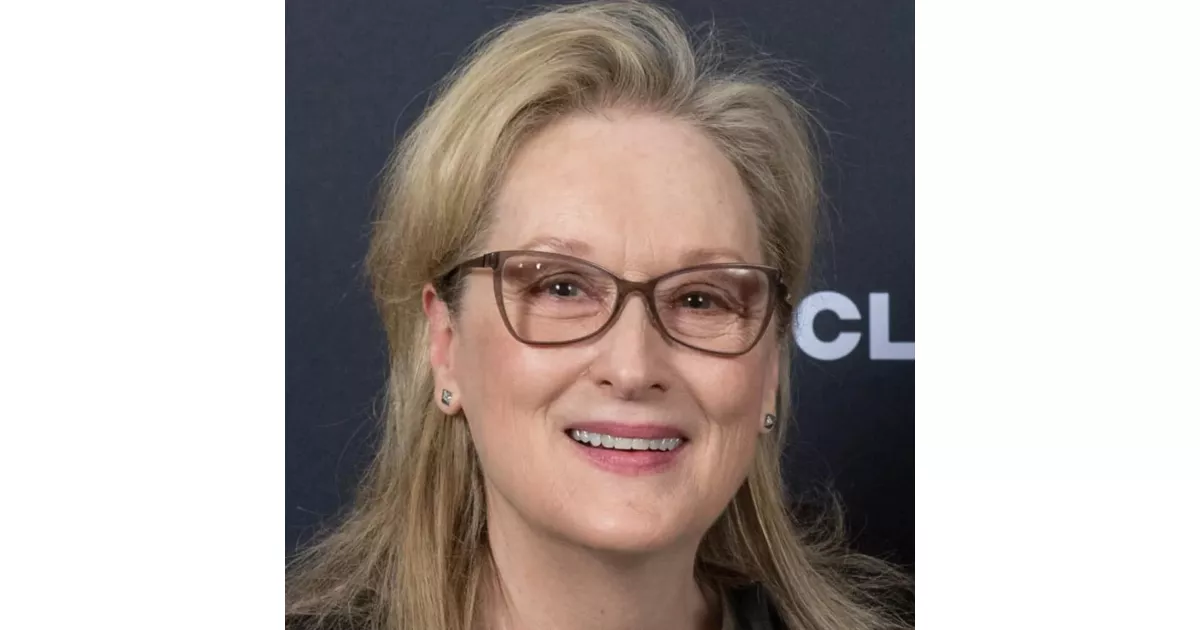Meryl Streep is a highly acclaimed American actress, celebrated for her versatility, masterful accent work, and considered by many as the best actress of her generation. Her illustrious career, spanning over five decades, is adorned with numerous prestigious awards, including three Academy Awards, two British Academy Film Awards, eight Golden Globe Awards, four Primetime Emmy Awards, and two Screen Actors Guild Awards. Streep's talent extends beyond acting, as evidenced by her nominations for seven Grammy Awards and a Tony Award, showcasing her significant impact across various entertainment mediums.
June 22, 1949: Meryl Streep Born
On June 22, 1949, Mary Louise "Meryl" Streep was born. She is an American actress known for her versatility.
1962: Viewed Mamma Roma prior to filming
In 1995, prior to filming The Bridges of Madison County, Meryl Streep viewed Pier Paolo Pasolini's Mamma Roma (1962).
1963: Family moved to Bernardsville, New Jersey
In 1963, Meryl Streep's family moved to Bernardsville, New Jersey, where she attended Bernards High School.
1964: Setting of Doubt
The movie Doubt is set in 1964, about the events that happen that year in a Catholic school in the Bronx, New York.
1969: Acted in Miss Julie at Vassar College
In 1969, Meryl Streep acted in the play Miss Julie at Vassar College, gaining attention across the campus.
1970: Visiting student at Dartmouth College
In 1970, Meryl Streep enrolled as a visiting student at Dartmouth College.
1971: Earned AB in drama cum laude
In 1971, Meryl Streep earned her AB in drama cum laude from Vassar College.
1975: Earned MFA in drama from Yale
In 1975, Meryl Streep earned her MFA in drama from Yale.
1975: First Professional Jobs and Move to NYC
In 1975, Meryl Streep had her first professional job at the Eugene O'Neill Theater Center's National Playwrights Conference and moved to New York City.
1975: Stage Debut in Trelawny of the Wells
In 1975, Meryl Streep made her stage debut in Trelawny of the Wells.
1976: Auditioned for King Kong and Broadway Appearances
In 1976, Meryl Streep auditioned unsuccessfully for King Kong and appeared in a double bill of plays on Broadway, receiving a Tony Award nomination.
1976: Meeting John Cazale
In 1976, Meryl Streep met actor John Cazale during a production of William Shakespeare's 'Measure for Measure' at the Delacorte Theater.
1976: A Memory of Two Mondays and 27 Wagons Full of Cotton
In 1976, Meryl Streep starred in the Broadway theatre productions 'A Memory of Two Mondays' and '27 Wagons Full of Cotton'.
1977: Cazale's Lung Cancer Diagnosis
In 1977, John Cazale was diagnosed with lung cancer, and Meryl Streep cared for him.
1977: First Film Role in Julia
In 1977, Meryl Streep had her first feature film role in Julia, although most of her scenes were edited out.
1977: Julia
In 1977, Meryl Streep starred in 'Julia', which is among her most acclaimed and highest-grossing films according to Rotten Tomatoes.
March 12, 1978: Death of John Cazale
On March 12, 1978, John Cazale, Meryl Streep's partner, died. She had been nursing him until his death.
March 1978: Death of John Cazale
In March 1978, John Cazale, Meryl Streep's partner, passed away from lung cancer.
May 1978: Uncommon Women and Others
In May 1978, Meryl Streep played the supporting role of Leilah in Wendy Wasserstein's Uncommon Women and Others.
1978: Role in The Deer Hunter
In 1978, Meryl Streep played a role in The Deer Hunter to remain with John Cazale during filming.
1978: Emmy Award for Holocaust
In 1978, Meryl Streep won a Primetime Emmy for her acting role in the miniseries Holocaust.
1979: Roles in The Seduction of Joe Tynan and Manhattan
In 1979, Meryl Streep appeared in The Seduction of Joe Tynan and Manhattan.
1979: Kramer vs. Kramer
In 1979, Meryl Streep starred in 'Kramer vs. Kramer', which is among her most acclaimed and highest-grossing films according to Rotten Tomatoes.
1979: The Seduction of Joe Tynan accent
In 1979, Meryl Streep used a southern American accent in 'The Seduction of Joe Tynan'.
1979: Awards for Kramer vs. Kramer and Other Films
In 1979, Meryl Streep won a Golden Globe and an Academy Award for Best Supporting Actress for Kramer vs. Kramer. She also received awards from other film critic associations for her collective work in her three film releases of the year. Both The Deer Hunter and Kramer vs. Kramer were major commercial successes and won the Academy Award for Best Picture consecutively.
1979: Wins First Academy Award for Kramer vs. Kramer
In 1979, Meryl Streep won her first Academy Award for Best Supporting Actress for her role in Kramer vs. Kramer.
1979: Birth of Henry Wolfe Gummer
In 1979, Meryl Streep's first child, Henry Wolfe Gummer, was born.
1979: Began workshopping Alice in Concert
In 1979, Streep began workshopping Alice in Concert with Elizabeth Swados and Joseph Papp.
December 1980: Alice in Concert at New York's Public Theater
In December 1980, Meryl Streep starred in Alice in Concert at New York's Public Theater.
1981: Comment on Actress's Career
In 1981, Meryl Streep commented on the limited career options available to actresses as they age, expressing concern about the industry's lack of interest in women in their mid-forties.
1981: Leading role in The French Lieutenant's Woman
In 1981, Meryl Streep played her first leading role in The French Lieutenant's Woman, a film about a story within a story. She starred opposite Jeremy Irons as contemporary actors and Victorian era characters. Streep developed an English accent for the role and won a BAFTA Award for Best Actress.
1981: Honorary Doctor of Arts degree from Dartmouth College
In 1981, Meryl Streep received an honorary Doctor of Arts degree from Dartmouth College.
1981: The French Lieutenant's Woman
In 1981, Meryl Streep starred in 'The French Lieutenant's Woman', which is among her most acclaimed and highest-grossing films according to Rotten Tomatoes.
1982: Still of the Night and Sophie's Choice
In 1982, Meryl Streep re-united with Robert Benton for the psychological thriller, Still of the Night. Later in 1982, Streep starred in the drama Sophie's Choice, portraying a Polish survivor of Auschwitz. Her performance and Polish accent drew praise.
1982: Sophie's Choice
In 1982, Meryl Streep starred in 'Sophie's Choice', which is among her most acclaimed and highest-grossing films according to Rotten Tomatoes.
1982: Wins Second Academy Award for Sophie's Choice
In 1982, Meryl Streep won her second Academy Award, this time for Best Actress, for her performance in Sophie's Choice.
1983: Portrayal of Karen Silkwood in Silkwood
In 1983, Meryl Streep played Karen Silkwood in Mike Nichols' biographical film Silkwood. She prepared for the role by meeting with people close to Silkwood and gathering information to understand her from the inside.
1983: Silkwood
In 1983, Meryl Streep starred in 'Silkwood', which is among her most acclaimed and highest-grossing films according to Rotten Tomatoes.
1983: Birth of Mary Willa "Mamie" Gummer
In 1983, Meryl Streep's daughter, Mary Willa "Mamie" Gummer, was born.
1984: Falling in Love
In 1984, Meryl Streep starred opposite Robert De Niro in the romance Falling in Love, which was poorly received.
1985: Move to Connecticut Estate
In 1985, Meryl Streep and her family moved into a $1.8-million private estate in Connecticut.
1985: Plenty
In 1985, Meryl Streep portrayed a fighter for the French Resistance during World War II in the British drama Plenty.
1985: Out of Africa
In 1985, Meryl Streep starred as Karen Blixen in Out of Africa, opposite Robert Redford. The film was a commercial success and won a Golden Globe for Best Picture. It also earned Streep another Academy Award nomination for Best Actress.
1985: Out of Africa and Plenty accents
In 1985, Meryl Streep used a Danish accent in 'Out of Africa' and British Received Pronunciation in 'Plenty'.
1986: Birth of Grace Jane Gummer
In 1986, Meryl Streep's daughter, Grace Jane Gummer, was born.
1988: Evil Angels accent
In 1988, Meryl Streep developed a hybrid of Australian and New Zealand English for 'Evil Angels', also released as 'A Cry in the Dark'.
1988: A Cry in the Dark
In 1988, Meryl Streep starred in 'A Cry in the Dark', which is among her most acclaimed and highest-grossing films according to Rotten Tomatoes.
1989: Evita and She-Devil
In 1989, Meryl Streep lobbied to play the lead role in Oliver Stone's adaption of the play Evita, but dropped out due to salary disputes. Later that year, she starred in She-Devil, a satire that parodied societal obsession with beauty and cosmetic surgery.
1990: Postcards from the Edge
In 1990, Carrie Fisher wrote the screenplay for Meryl Streep's film 'Postcards from the Edge', based on Fisher's book.
1990: Purchase of Brentwood Mansion
In 1990, Meryl Streep and her family bought a $3-million mansion in Brentwood, Los Angeles.
1990: SAG National Women's Conference Keynote
In 1990, Meryl Streep keynoted the Screen Actor's Guild National Women's Conference, emphasizing the decline in women's work opportunities, pay parity, and role models within the film industry.
1991: Defending Your Life
In 1991, Meryl Streep starred in 'Defending Your Life', which is among her most acclaimed and highest-grossing films according to Rotten Tomatoes.
1991: Birth of Louisa Jacobson Gummer
In 1991, Meryl Streep's daughter, Louisa Jacobson Gummer, was born.
1992: Death Becomes Her
In 1992, Meryl Streep starred in the black comedy Death Becomes Her. Despite its commercial success, Streep later admitted to disliking filming the scenes involving heavy special effects.
1993: The House of the Spirits
In 1993, Meryl Streep appeared in The House of the Spirits, set in Chile during Augusto Pinochet's dictatorship. The film was not well received by critics.
1995: The Bridges of Madison County
In 1995, Meryl Streep starred in 'The Bridges of Madison County', which is among her most acclaimed and highest-grossing films according to Rotten Tomatoes.
1996: Marvin's Room
In 1996, Meryl Streep played the estranged sister of Bessie in Marvin's Room. Streep recommended Keaton for the role and earned a Golden Globe nomination for her performance.
1997: ...First Do No Harm
In 1997, Meryl Streep starred in the television film '...First Do No Harm'.
1997: First Do No Harm Emmy Nomination
In 1997, Meryl Streep's performance in First Do No Harm earned her a second Emmy Award nomination for Outstanding Lead Actress in a Miniseries or a Movie.
1998: Dancing at Lughnasa and One True Thing
In 1998, Meryl Streep starred in Dancing at Lughnasa opposite Michael Gambon and Catherine McCormack. The film was an adaptation of a Broadway play and was entered into the Venice Film Festival. Also in 1998, she played a housewife dying of cancer in One True Thing, which received positive reviews.
1998: Publication of Evening
In 1998, the novel 'Evening' by Susan Minot was published, which was later adapted into a movie where Meryl Streep acted in 2007.
1999: Music of the Heart
In 1999, Meryl Streep starred as Roberta Guaspari in the music drama Music of the Heart, earning nominations for an Academy Award, a Golden Globe, and a Screen Actors Guild Award.
1999: Publication of 'Mrs. Dalloway'
In 1999, the novel 'Mrs. Dalloway' by Virginia Woolf was published, which later became a part of the movie 'The Hours' where Meryl Streep acted in 2002.
December 11, 2001: Nobel Peace Prize Concert Co-hosting
On December 11, 2001, Meryl Streep co-hosted the annual Nobel Peace Prize Concert with Liam Neeson in Oslo, Norway, honoring the United Nations and Kofi Annan.
2002: Adaptation
In 2002, Meryl Streep starred in 'Adaptation', which is among her most acclaimed and highest-grossing films according to Rotten Tomatoes.
2002: Adaptation and The Hours
In 2002, Meryl Streep starred in Spike Jonze's comedy-drama Adaptation, playing Susan Orlean, and won a Golden Globe for Best Supporting Actress. She also appeared in The Hours alongside Nicole Kidman and Julianne Moore, a film based on the novel Mrs. Dalloway, winning a Silver Bear for Best Actress with her co-stars.
2003: Publication of The Devil Wears Prada
In 2003, Lauren Weisberger's novel 'The Devil Wears Prada' was published, which was later adapted into a movie where Meryl Streep acted in 2006.
2003: Honorary César
In 2003, Meryl Streep received an Honorary César.
2003: Angels in America
In 2003, Meryl Streep starred in HBO's adaptation of Tony Kushner's Angels in America, winning her second Emmy Award and fifth Golden Globe for her performance in four roles.
2003: Emmy Award for Angels in America
In 2003, Meryl Streep won a Primetime Emmy for her acting role in the miniseries Angels in America.
2004: The Manchurian Candidate and Lemony Snicket's A Series of Unfortunate Events
In 2004, Meryl Streep appeared in The Manchurian Candidate, playing a U.S. senator, and in Lemony Snicket's A Series of Unfortunate Events as Aunt Josephine. She also narrated the film Monet's Palate in 2004.
2004: AFI Life Achievement Award
In 2004, Meryl Streep received the AFI Life Achievement Award.
2005: Prime
In 2005, Meryl Streep starred in the comedy film Prime, playing Lisa Metzger, a psychoanalyst. The film was a modest success, grossing US$67.9 million internationally.
September 2006: Mother Courage and Her Children Onstage
In August and September 2006, Meryl Streep starred in The Public Theater's production of Mother Courage and Her Children at the Delacorte Theatre in Central Park. The play featured a new translation by Tony Kushner and songs by Jeanine Tesori, directed by George C. Wolfe.
2006: Sophie's Choice most famous scene
In 2006, Emma Brockes of The Guardian wrote that the 'choice' scene in Sophie's Choice, filmed in 1982, in which Streep is ordered to choose which of her two children would be gassed, is her most famous scene.
2006: The Devil Wears Prada Release
In 2006, Meryl Streep starred in The Devil Wears Prada as Miranda Priestly, a fashion magazine editor. The film was a commercial success, grossing over US$326.5 million worldwide, and Streep received critical acclaim and award nominations, including an Oscar nomination and a Golden Globe.
2006: A Prairie Home Companion accent
In 2006, Meryl Streep used a Minnesota accent in 'A Prairie Home Companion'.
April 2007: Virginia Tech Shooting and Shelving of Dark Matter
In April 2007, following the Virginia Tech shooting, producers of the film Dark Matter, starring Meryl Streep, decided to shelve the film out of respect for the victims.
2007: Evening and Lions for Lambs
In 2007, Meryl Streep had a short role in the drama film Evening and also starred in Robert Redford's Lions for Lambs. Both films received lukewarm reactions from critics.
2007: The Devil Wears Prada
In 2007, Meryl Streep starred in 'The Devil Wears Prada', which is among her most acclaimed and highest-grossing films according to Rotten Tomatoes.
October 2008: Mamma Mia! on Portuguese Music Charts
In October 2008, after Meryl Streep starred in Mamma Mia!, her rendition of the titular song rose to popularity on the Portuguese music charts, peaking at number eight. Also in 2008, at the 35th People's Choice Awards, her version of "Mamma Mia" won an award for "Favorite Song From A Soundtrack".
December 2008: Lack of religious belief
In December 2008, Meryl Streep alluded to her lack of religious belief.
2008: Doubt and Mamma Mia!
In 2008, Meryl Streep appeared in Doubt and Mamma Mia!.
2008: Gala Tribute from the Film Society of Lincoln Center
In 2008, Meryl Streep received a Gala Tribute from the Film Society of Lincoln Center.
2008: Doubt Release
In 2008, Meryl Streep starred in Doubt, a drama about accusations of pedophilia in a Catholic school. The film was a moderate box office success and received five Academy Awards nominations.
2008: Release of Dark Matter and Rendition
In 2008, Meryl Streep's film Dark Matter received a limited release and negative to mixed reviews. She also starred in the political thriller Rendition in 2008, which was less commercially successful and received mixed reviews.
2008: Praise for Plenty performance
In 2008, Molly Haskell praised Streep's performance in Plenty, calling it one of her "most difficult and ambiguous" films and "most feminist" role.
2009: Julie & Julia, It's Complicated
In 2009, Meryl Streep appeared in Julie & Julia and It's Complicated.
2009: Fantastic Mr. Fox
In 2009, Meryl Streep starred in 'Fantastic Mr. Fox', which is among her most acclaimed and highest-grossing films according to Rotten Tomatoes.
2009: Statements about religion
In 2009, when asked if religion plays a part in her life, Meryl Streep replied that she follows no doctrine and doesn't belong to any religious institution.
2010: National Medal of Arts
In 2010, President Barack Obama awarded Meryl Streep the National Medal of Arts.
2011: Kennedy Center Honor
In 2011, Meryl Streep received the Kennedy Center Honor.
2011: The Iron Lady Release
In 2011, Meryl Streep starred in The Iron Lady, a biographical film about Margaret Thatcher, earning her Best Actress awards at the Golden Globes, BAFTAs, and the Academy Awards.
2011: Wins Third Academy Award for The Iron Lady
In 2011, Meryl Streep won her third Academy Award for Best Actress for her role as Margaret Thatcher in The Iron Lady.
October 4, 2012: Donation to The Public Theater
On October 4, 2012, Meryl Streep donated $1 million to The Public Theater in honor of Joseph Papp and Nora Ephron.
2012: Hope Springs Release
In 2012, Meryl Streep reunited with director David Frankel for the romantic comedy-drama "Hope Springs," co-starring Tommy Lee Jones and Steve Carell. The film follows a middle-aged couple attending marriage counseling to revive their intimacy. The reviews were mostly positive, praising the actors' performances.
2013: August: Osage County
In 2013, Meryl Streep starred in "August: Osage County" alongside Julia Roberts and Ewan McGregor. The black comedy-drama, based on Tracy Letts's play, features Streep as a contentious matriarch battling oral cancer and addiction. Her performance garnered positive reviews and award nominations.
July 2014: Announcement of Master Class role
In July 2014, it was announced that Meryl Streep would portray Maria Callas in Master Class, but the project was cancelled after director Mike Nichols's death in November of the same year.
November 2014: Presidential Medal of Freedom
In November 2014, Meryl Streep was awarded the Presidential Medal of Freedom by President Barack Obama. The citation acknowledged Streep as one of history's most acclaimed actors, praising her ability to portray a wide range of roles.
2014: The Giver and The Homesman
In 2014, Meryl Streep appeared in "The Giver," playing a community leader in a post-apocalyptic setting. She also had a small role in the period drama "The Homesman," playing a preacher's wife. "The Homesman" premiered at the Cannes Film Festival and received positive reviews.
2014: Establishment of Scholarships
In 2014, Meryl Streep established two scholarships at the University of Massachusetts Lowell: the Meryl Streep Endowed Scholarship for English majors and the Joan Hertzberg Endowed Scholarship for math majors.
2014: The Homesman
In 2014, Meryl Streep starred in 'The Homesman', which is among her most acclaimed films.
2014: Presidential Medal of Freedom
In 2014, President Barack Obama awarded Meryl Streep the Presidential Medal of Freedom.
April 2015: Funding of Screenwriters Lab
In April 2015, Meryl Streep funded a screenwriters lab for female screenwriters over forty years old, called the Writers Lab.
2015: Ricki and the Flash and Suffragette releases
In 2015, Meryl Streep starred in "Ricki and the Flash" as a rock musician and grocery store worker. She also played Emmeline Pankhurst in "Suffragette", a film about the British suffragette movement. Both films received mixed to positive reviews.
2015: Fonda's Lasting Influence
In 2015, Meryl Streep stated that Jane Fonda had a lasting influence on her as an actress.
2015: Criticism of Rotten Tomatoes
In 2015, while promoting 'Suffragette', Meryl Streep criticized the review-aggregation website Rotten Tomatoes for disproportionately representing the opinions of male film critics, which she believed adversely affected the performance of female-driven films.
March 2016: Signing Letter for Gender Equality
In March 2016, Meryl Streep signed a letter asking for gender equality throughout the world, in observance of International Women's Day, organized by One Campaign.
2016: Speech at the Democratic National Convention
In 2016, Meryl Streep gave a speech at the Democratic National Convention in support of presidential nominee Hillary Clinton.
2016: Florence Foster Jenkins
In 2016, Meryl Streep starred in 'Florence Foster Jenkins', which is among her most acclaimed films.
January 2017: Cecil B. DeMille Award and Political Speech
In January 2017, Meryl Streep was honored with the Cecil B. DeMille Award at the 74th Golden Globe Awards. During the ceremony, she delivered a political speech implicitly criticizing President-elect Donald Trump for mocking a disabled reporter, Serge F. Kovaleski. Trump responded by calling Streep "one of the most over-rated actresses in Hollywood".
January 2017: Cecil B. DeMille Award at the Golden Globes
In January 2017, Viola Davis presented Meryl Streep with the Cecil B. DeMille Award at the Golden Globes. During her acceptance speech, Streep quoted Carrie Fisher, encouraging others to turn heartbreak into art.
April 25, 2017: Support for Oleg Sentsov
On April 25, 2017, Meryl Streep publicly backed the campaign to free Oleg Sentsov, a Ukrainian filmmaker from Crimea, who was jailed in Siberia.
2017: Introduced Carmen de Lavallade at Kennedy Center Honors
In 2017, Meryl Streep introduced choreographer Carmen de Lavallade at the Kennedy Center Honors.
2017: Golden Globe Cecil B. DeMille Award
In 2017, Meryl Streep received the Golden Globe Cecil B. DeMille Award.
2017: The Post Release
In 2017, Meryl Streep starred in Steven Spielberg's "The Post" as Katharine Graham, the first American female newspaper publisher, alongside Tom Hanks. The film, about The Washington Post's publication of the Pentagon Papers, received positive reviews and earned Streep her 31st Golden Globe nomination and 21st Academy Award nomination.
2018: Mamma Mia! Here We Go Again and Mary Poppins Returns
In 2018, Meryl Streep briefly reprised her role in "Mamma Mia! Here We Go Again" and played a supporting role in "Mary Poppins Returns".
2018: Time's Up Initiative
In 2018, Meryl Streep collaborated with 300 women in Hollywood to set up the Time's Up initiative to protect women from harassment and discrimination.
2018: Last Public Appearance with Gummer
Meryl Streep and Don Gummer were publicly last seen together at the 90th Academy Awards in 2018.
2019: Little Women
In 2019, Meryl Streep starred in 'Little Women', which is among her most acclaimed films.
2019: Big Little Lies Season 2
In 2019, Meryl Streep starred in the second season of HBO's "Big Little Lies" as Mary Louise Wright, receiving an Emmy nomination for her performance.
2020: Let Them All Talk
In 2020, Meryl Streep starred in 'Let Them All Talk'.
2020: Here We Are, The Prom and Let Them All Talk
In 2020, Meryl Streep voiced a role in the Apple TV+ animated short film "Here We Are: Notes for Living on Planet Earth" and had leading roles in Ryan Murphy's "The Prom" and Steven Soderbergh's "Let Them All Talk," both released by streaming services.
2021: Don't Look Up Release
In 2021, Meryl Streep starred in Adam McKay's "Don't Look Up" for Netflix, playing the comical role of the President of the United States.
June 2023: SAG-AFTRA Strike Threat
In June 2023, it was reported that Meryl Streep was one of many A-List members of the SAG-AFTRA who signed a letter threatening to strike.
2023: Extrapolations and Only Murders in the Building
In 2023, Meryl Streep acted in the Apple TV+ anthology series "Extrapolations" and began playing Loretta Durkin in the third season of the Hulu comedy series "Only Murders in the Building". She received Golden Globe and Primetime Emmy Award nominations and won a Critics' Choice Television Award.
2023: Only Murders in the Building
In 2023, Meryl Streep took a role in the Hulu comedy-mystery series Only Murders in the Building.
2023: Separation from Don Gummer Reported
In 2023, it was reported that Meryl Streep and Don Gummer had been separated for more than six years.
2024: Honorary Palme d'Or
In 2024, Meryl Streep received the Honorary Palme d'Or.
August 18, 2025: Biopic Role Announcement
On August 18, 2025, it was announced that Meryl Streep will play Joni Mitchell in the present day in a biopic on the life and career of the musician.
2025: Saturday Night Live 50th Anniversary Special Appearance
In 2025, Meryl Streep attended the Saturday Night Live 50th Anniversary Special, her first appearance on the show, in an alien abduction skit.
March 6, 2026: Hoppers Release
On March 6, 2026, Meryl Streep will be voicing the Queen Butterfly in the Pixar Animation Studios film Hoppers.
May 1, 2026: Devil Wears Prada 2 Release
On May 1, 2026, Meryl Streep is set to reprise the role of Miranda Priestly in The Devil Wears Prada 2.
Mentioned in this timeline

Donald John Trump is an American politician media personality and...
Home Box Office HBO is an American pay television service...

Barack Obama the th U S President - was the...

Hillary Diane Rodham Clinton is a prominent American politician lawyer...

Steven Spielberg is a highly influential American filmmaker recognized as...
Saturday Night Live SNL is a late-night live sketch comedy...
Trending

36 minutes ago Selena Gomez's Spiced-Plum Manicure and TikTok Clone Theory Spark Buzz

36 minutes ago Kit Harington and Sophie Turner Gag After On-Screen Kiss in New Movie

36 minutes ago Trump administration updates, Iran nuclear efforts, and White House controversies unfold.

37 minutes ago Dario Amodei Highlights India's Central Role in Shaping AI's Future at AI Summit.

2 hours ago Yoon Suk Yeol, South Korean ex-president, receives life sentence for insurrection and martial law.

4 hours ago Maya Hawke and Christian Lee Hutson celebrated wedding with Stranger Things cast present.
Popular

Jesse Jackson is an American civil rights activist politician and...
Randall Adam Fine is an American politician a Republican who...

Pam Bondi is an American attorney lobbyist and politician currently...

Barack Obama the th U S President - was the...

Martin Luther King Jr was a pivotal leader in the...

Ken Paxton is an American politician and lawyer serving as...



